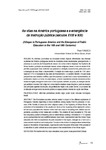Mostrar o rexistro simple do ítem
A emerxencia da educación pública nas cidades da América portuguesa durante os séculos XVIII e XIX
| dc.contributor.author | Lima e Fonseca, Thais Nívia | |
| dc.date.accessioned | 2020-01-09T09:49:32Z | |
| dc.date.available | 2020-01-09T09:49:32Z | |
| dc.date.issued | 2019 | |
| dc.identifier.citation | Fonseca, T. (2019). A emerxencia da educación pública nas cidades da América portuguesa durante os séculos XVIII e XIX. Sarmiento. Revista Galego-Portuguesa De Historia Da Educación, 23, 13-30. https://doi.org/10.17979/srgphe.2019.23.0.5874 | es_ES |
| dc.identifier.issn | 1138-5863 | |
| dc.identifier.uri | http://hdl.handle.net/2183/24576 | |
| dc.description.abstract | [Resumo] As reformas pombalinas da educación tiveron impacto diferenciado nas diversas capitanias de América portuguesa debido ás condicións locais relacionadas, principalmente, coa presenza ou ausencia da Compañía de Jesus e doutras ordes relixiosas. Na Capitania de Minas Xerais a prohibición da instalación desas ordes relixiosas, desde o inicio do século XVIII, permitiu á poboación local, conforme a súa calidade e condición, buscar formas particulares para a educación dos seus fillos e dependentes. A creación do ensino rexio, a partir de 1759, asociada en 1772 á imposición do seu medio de financiamento -o subsidio literario- trouxo novas perspectivas pero tamén conflitos, que interpuxeron o poder local e os seus representantes, os profesores rexios e a Coroa. As clases rexias, primeira experiencia concreta da escola pública estatal na rexión, emerxeron como valor e como aparello, tamén, de poder, e medida das forzas políticas e sociais. Este artigo ten como obxectivo analizar esas relacións a partir da actuación dos principais axentes municipais, dos profesores rexios e do poder central, no proceso de construción do lugar social da escola pública no espazo urbano colonial da rexión das Minas. | es_ES |
| dc.description.abstract | [Abstract] The Pombaline education reforms varied in impact in the different captaincies of Portuguese America depending on local conditions arising mainly from the presence or absence of the Society of Jesus and other religious orders. In the Captaincy of Minas Gerais, the prohibition of the installation of the Jesuits and others at the beginning of the eighteenth century left the local population the freedom to find their own ways of educating their children and dependents, according to their status and condition. The creation of royal education in 1759 and the compulsory system of financing (the so-called ‘literary subsidy’) introduced in 1772 opened up new perspectives but also conflicts between local rulers, royal teachers and the Crown. Royal education, the first real experience of public education in the region, emerged as a mark and a measurement of political and social power. The aim of this article is to analyse these relationships based on the actions of local leaders, royal teachers and the power of the state in the process of construction of public schools as a social space in the colonial towns of the Minas region | es_ES |
| dc.language.iso | por | es_ES |
| dc.publisher | Universidade da Coruña | es_ES |
| dc.relation.uri | https://doi.org/10.17979/srgphe.2019.23.0.5874 | es_ES |
| dc.rights | Atribución-CompartirIgual 4.0 España | es_ES |
| dc.rights.uri | http://creativecommons.org/licenses/by-sa/3.0/es/ | * |
| dc.subject | Reformas pombalinas | es_ES |
| dc.subject | Ensino rexio | es_ES |
| dc.subject | Poder local | es_ES |
| dc.subject | Poder municipal | es_ES |
| dc.subject | Brasil | es_ES |
| dc.subject | Pombaline reforms | es_ES |
| dc.subject | Royal education | es_ES |
| dc.subject | Local power | es_ES |
| dc.subject | Local government | es_ES |
| dc.subject | Brazil | es_ES |
| dc.title | A emerxencia da educación pública nas cidades da América portuguesa durante os séculos XVIII e XIX | es_ES |
| dc.title.alternative | Villages in Portuguese America and the Emergence of Public Education in the 18th and 19th Centuries | es_ES |
| dc.type | info:eu-repo/semantics/article | es_ES |
| dc.rights.access | info:eu-repo/semantics/openAccess | es_ES |
| UDC.journalTitle | Sarmiento: Anuario galego de historia da educación | es_ES |
| UDC.volume | 23 | es_ES |
| UDC.startPage | 13 | es_ES |
| UDC.endPage | 30 | es_ES |
Ficheiros no ítem
Este ítem aparece na(s) seguinte(s) colección(s)
-
REV - Sarmiento - Nº 23, 2019 [22]
Monográfico: Municipios e educación






